Dry weather should linger into much of Friday, highs in the 70s today and Friday.
.43" rain predicted over the weekend (best chance of rain Friday night into Saturday morning). Much of Saturday afternoon and Sunday should be dry with intervals of sun and just a few isolated, "pop-up" showers and T-storms over the weekend.
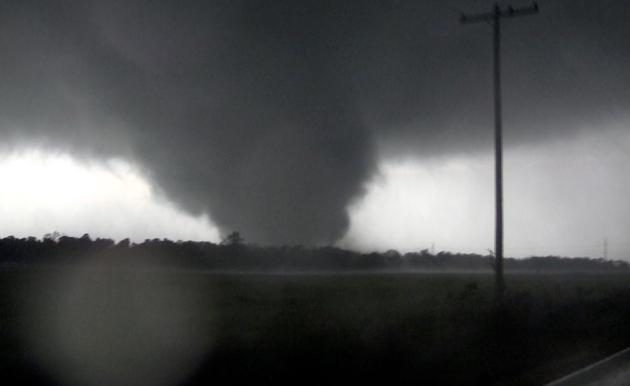
..."And, as (the Aprill 27 tornado outbreak) reminds us, 70 % of the world’s tornadoes, and some 90% of the truly damaging tornadoes, occur on our soil." - Dr. William Hooke, Director of the AMS Policy Program, in Senate testimony May 3 in Washington D.C."

..."But before we succumb to digital idolatry, we should consider that innovation often comes at a price. And sometimes I wonder if the price is a piece of ourselves." - Bill Keller, Executive Editor of the New York Times, in an editorial about Twitter and digital media (below).

"Weekends are a bit like rainbows; they look good from a distance but disappear when you get up close to them." - John Shirley quote. This upcoming won't be a total wash-out, but a few hours of showers and T-storms are likely. At least it will be lukewarm rain, highs well up into the 70s. Column below.

Early Season Anglers Face Cold Water Dangers. I was out on Lake Minnetonka yesterday, and that water is still COLD. It felt more like late April than mid May. The Minnesota DNR has a story about the unusually chilly lake water temperatures across the state: "With the walleye and northern fishing season opening on May 14, the Minnesota Department of Natural Resources (DNR) reminds anglers that even on a warm day in the boat, water temperatures can hover in the low 50s. A 2007 report by the U.S. Coast Guard stated that a boating accident is five times more likely to be fatal if the water is colder than 60 degrees. “Cold water can kill in ways that you might not expect,” said Tim Smalley, DNR boating safety specialist. “Nearly everyone knows that immersion in cold water can cause hypothermia - the abnormal lowering of the body’s core temperature. What most don’t know is that cold water immersion has several stages, any one of which can cause death.” Victims who experience an unexpected fall overboard suffer initial cold water shock in the first minute, which involuntarily causes them to take a series of big breaths, called hyperventilation. If a person’s head is underwater, they can inhale more than a quart of water and drown immediately. Those who keep their head above water will continue hyperventilating as their blood pressure jumps, Smalley explained. If they can’t control their breathing within 60 seconds, they’ll suffer numbness, muscle weakness or even fainting, which leads to drowning. A person with heart disease may experience sudden death due to cardiac arrest. A victim who survives the first minute of cold shock and hyperventilation will progress to the second stage called “cold incapacitation,” or swimming failure. Within about 10 minutes, rapid cooling of the extremities causes muscle stiffening so a person will no longer be able to perform the tasks, such as swimming, holding onto a floating object, or putting on a life jacket. Even yelling for help can be difficult."
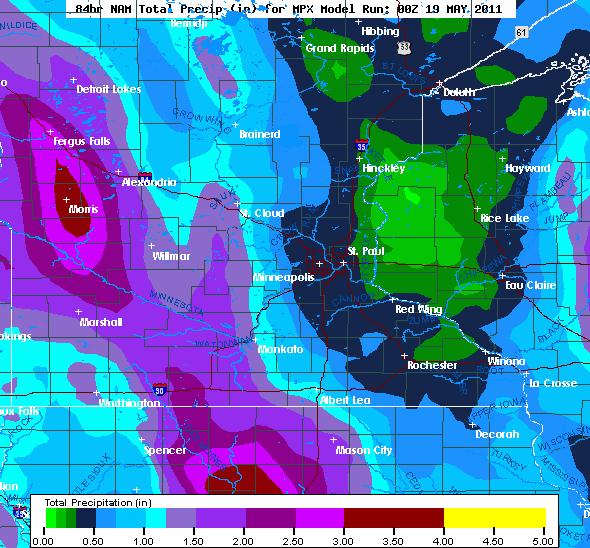
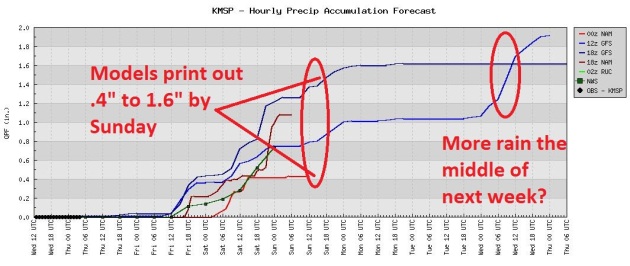
Partly-Soggy. The best chance of (heavy) showers and T-storms should come Friday night into Saturday morning, and then we slowly dry out Saturday afternoon into Sunday, a lack of significant rain through Wednesday morning of next week, before another round of showers arrive next Wednesday. In general temperatures will run a few degrees below average through next week - still don't see any 80s until (maybe) the first few days of June.

European Model. The ECMWF (European) model also suggests that Saturday will be the wetter day of the weekend, with 14 millimeters of rain predicted, about .55". The ECMWF doesn't print out any rain on Sunday, but I'm not so sure a few instabiity showers and PM T-showers won't pop. Either way, I feel fairly confident saying that Sunday should be the brighter day of the weekend (few hours of sun) allowing the mercury to reach the mid 70s to near 80.

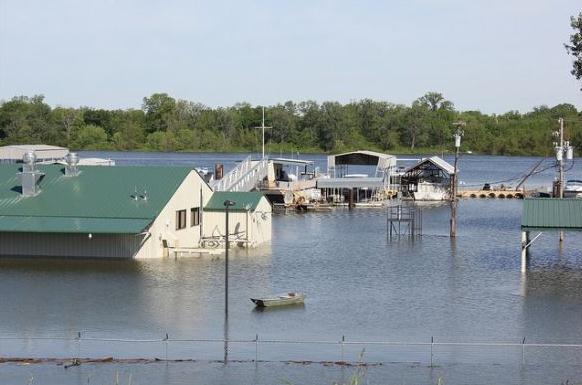

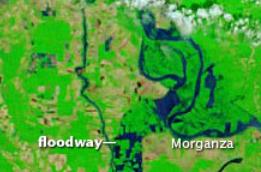
Water In The Morganza Floodway. NASA's Earth Observatory has an update on the Great Mississippi River Flood of 2011 - you can clearly see the floodwaters rising after the floodways were opened on the Mississippi. The top (before) photo is from May 4, the bottom photo taken on May 18: "On May 18, 2011, the Moderate Resolution Imaging Spectroradiometer (MODIS) on NASA’s Terra satellite observed water in the Morganza Floodway along the Mississippi River. As the U.S. Army Corps of Engineers explains, the floodway is designed to ease water levels in downstream communities along the Mississippi by diverting some water into the Atchafalaya Basin. MODIS acquired the top image on May 18, 2011, and the bottom image on May 4, 2011. Both images use a combination of visible and infrared light to increase contrast between water and land. Water ranges in color from gray-blue to navy. (Lake Pontchartrain appears silvery blue on May 18 due largely to the angle of sunlight.) Vegetation is green. Bare ground is brown. Clouds are pale blue-green and cast shadows."
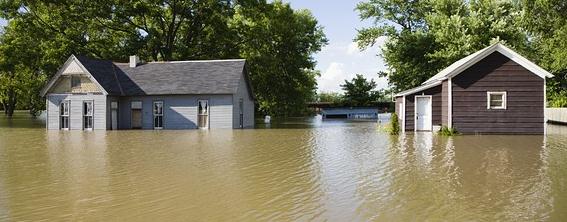
Policy Buzz: Senate Hearing Follows Tornado Outbreak. Here's an interesting story for the American Meteorological Society's blog: "On May 3, Dr. William Hooke, Director of the AMS Policy Program, testified before Senator John Rockefeller (D-WV) and other members of the U.S. Senate Committee on Commerce, Science and Transportation. He was joined by Bob Ryan, Senior Meteorologist at ABC7/WJLA-TV, Dr. Anne Kiremidjian of Stanford University and Dr. Clint Dawson of the University of Texas, together they discussed “America’s Natural Disaster Preparedness: Are Federal Investments Paying Off?” As the hearing was convened in part as a response to the earthquake in Japan, Dr. Kiremidjian focused her testimony on earthquake and tsunami issues. Dr. Dawson discussed advances in storm surge modeling. This hearing (full video here) took place soon after one of the worst weather disasters in the U.S. of the last century with tornadoes killing at least 327 in the South East. According to the National Oceanic and Atmospheric Administration (NOAA) this may have been the largest tornado outbreak in U.S. history. Although this disaster was horrific in terms of the many lives lost and the huge economic toll, the hearing gave our community the needed opportunity to highlight what we do and the importance of accurate weather forecasts and earth observation systems. Dr. Hooke stated in his testimony that these systems and science play an especially important role in the United States:"
"Because of its size and location, the United States bears a unique degree of risk from natural hazards. We suffer as many winter storms as Russia or China, and as many hurricanes as China or Japan. Our coasts are exposed not just to storms but to earthquakes and tsunamis. Dust bowls and wildfire have shaped our history. And 70% of the world’s tornadoes, and some 90% of the truly damaging ones, occur on our soil."

Ukraine Weather Forecaster's Remarks Spark Storm. Yes, it turns out you can be fired for telling the truth, and predicting which way the political and social winds are blowing, instead of tracking highs, lows and frontal boundaries. The BBC reports: "Ukraine's national broadcaster has suspended its live weather broadcasts after a forecaster commented on the country's gloomy political climate. The National Meteorological Centre's chief meteorologist praised the beauty of spring before berating "disorder, lawlessness and injustice" in Ukraine. Lyudmila Savchenko was broadcasting live on National Radio when she made the disparaging remarks. Forecasts will be now pre-recorded and edited before being aired. "You cannot remain indifferent to the beauty, complete with the delicate scents of lilacs and lilies of the valley, the melodic trills of birds," said Ms Savchenko in last week's fatal forecast. "Sometimes it seems like the nature is compensation for the disorder, lawlessness and injustice in our country." This is not the first time Ukraine's media has been rebuked for interfering in politics. In 2004, Ukrainian National TV fired a sign-language interpreter for telling viewers that the authorities were lying. Ms Savchenko is quoted by the popular Ukrainian Pravda as saying she was well aware of the consequences of her critical statements. "I did what I had to," she said. "I said what I believed was true and I still believe it. I knew I would never go on air again."

The Twitter Trap. Are we being hypnotized by digital media? Seduced by Facebook posts, staring at way too many screens when we should be connecting (face to face), or taking in nature. You know the argument: watching vs. doing. I have mixed feelings. We've never been more empowered, with more relevant information at our fingertips to make decisions and improve our lives and businesses. I don't know - I've always thought of myself as reasonably social, but lately I send a text or e-mail instead of picking up the phone call and going to the "effort" of making a call. What are we losing by leaning more on digital communication, and less on voice and face-to-face? Not sure. But I'm pretty sure similar concerns were raised about reading and books and the telegraph and radio and TV and then cable and satellite. It's hard to put the toothpaste back in the tube.
Bill Keller is Executive Editor at the New York Times (top guy on the editorial/content side) and he sparked something of a controversy by writing this column: "Last week my wife and I told our 13-year-old daughter she could join Facebook. Within a few hours she had accumulated 171 friends, and I felt a little as if I had passed my child a pipe of crystal meth. I don’t mean to be a spoilsport, and I don’t think I’m a Luddite. I edit a newspaper that has embraced new media with creative, prizewinning gusto. I get that the Web reaches and engages a vast, global audience, that it invites participation and facilitates — up to a point — newsgathering. But before we succumb to digital idolatry, we should consider that innovation often comes at a price. And sometimes I wonder if the price is a piece of ourselves. Joshua Foer’s engrossing best seller “Moonwalking With Einstein” recalls one colossal example of what we trade for progress. Until the 15th century, people were taught to remember vast quantities of information. Feats of memory that would today qualify you as a freak — the ability to recite entire books — were not unheard of. Then along came the Mark Zuckerberg of his day, Johannes Gutenberg. As we became accustomed to relying on the printed page, the work of remembering gradually fell into disuse. The capacity to remember prodigiously still exists (as Foer proved by training himself to become a national memory champion), but for most of us it stays parked in the garage."



Another Picture Postcard Perfect Day. 4 dry, sunny, spectacular days in a row? I didn't think that was possible, but the weather since Sunday has been nothing less than extraordinary. Some patchy clouds drifted into Minnesota (from the east, from Wisconsin) by evening, but it didn't matter. The mercury rose to 66 at Duluth, 73 in the Twin Cities and 74 at St. Cloud.

Paul's SC Times Outlook for St. Cloud and all of central Minnesota:
TODAY: Fading sun, still very nice. Winds: E 8-13. High: near 72
THURSDAY NIGHT: Partly to mostly cloudy, probably dry. Low: 57
FRIDAY: Mostly cloudy and mild, a shower or T-storm possible by evening. High: 74
FRIDAY NIGHT: Showers and a few T-storms likely. Low: 58
SATURDAY: Stormier day of the weekend. Showers and T-storms likely, especially AM hours. Winds: SE 15-20. High: 75
SATURDAY NIGHT: Showers and T-storms linger, locally heavy rain possible. Low: 61
SUNDAY: Better day of the weekend? Peeks of sun, passing PM shower or storm. Winds: SW 10-15. High: 78
MONDAY: Damp, leftover shower or two. Low: 60. High: 69
TUESDAY: Clouds increase, rain arrives late in the day and at night? Low: 53. High: 67
WEDNESDAY: More showery rains. Soggy pattern. Low: 55. High: 68
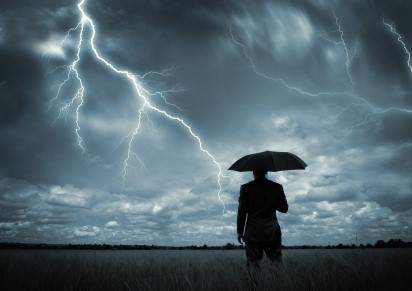
Weekend Weather Angst
"Weekends are a bit like rainbows; they look good from a distance but disappear when you get up close to them" wrote John Shirley. How true. Philosopher/poet Arnot Sheppard summed up my theory about weekend weather complications. "There is little chance that meteorologists can solve the mysteries of weather until they gain an understanding of the mutual attraction of rain and weekends." If we could just move weekends to Tuesdays and Wednesdays.
An atmospheric squeeze-play is unfolding. Last Saturday's (miserable) storm is pin-wheeling westward (!) while a sloppy Pacific storm moves in from the west. Translation: heavy showers and T-storms Friday into Saturday, maybe an inch or more of liquid gold for lawns & fields. Dynamics aloft are marginal, but there's a slight risk of a few (isolated) severe storms by Saturday afternoon, especially over far southern Minnesota. I suspect Sunday will be slightly better: intervals of sun, highs well up into the 70s to near 80. Not a total wash-out.
Temperatures trend slightly cooler than average into next week; still no 80s in sight. The odds of summer drought are slim to nil; odds favor a slightly cooler, wetter summer. We'll see.
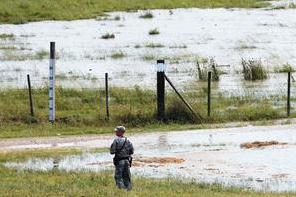
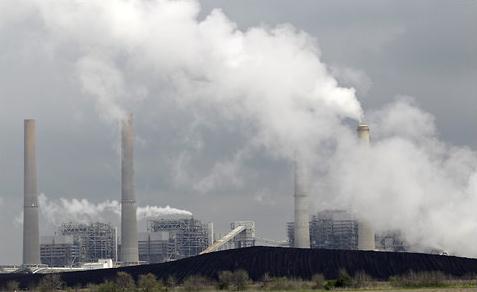
* The Harvard paper (which has some compelling ideas) is called the "Hamilton Project", the complete PDF is here. A summary: "Despite bipartisan interest in advancing American energy policy, comprehensive energy and climate legislation fell short in the Senate last year after passing in the House of Representatives in 2009. The difficulty of coming to broad agreement highlights the need for a more targeted and incremental approach. One promising intermediate step would be a technology-neutral national clean energy standard that applies to the U.S. power sector. This paper proposes a standard that would lower carbon dioxide emissions by as much as 60 percent relative to 2005 levels over twenty years, streamline the fragmented regulatory system that is currently in place, generate fiscal benefits, and help fund energy innovation. Through a simple design and transparent implementation, the National Clean Energy Standard would provide certainty about the economic returns to clean energy that would facilitate investment in new energy projects and lower the emission intensity of the power sector. It would also serve as an ambitious bridge to economy-wide energy and climate policy."

Huntsman's Trust In Global-Warming Science Leaves Conservatives Cold. NPR has a story about a Republican who actually defers to the climate scientists. Yes, he's my new personal hero: "A recent interview with Jon Huntsman in Time Magazine has underscored for some conservatives the concerns they have with former Utah governor, that he is, as some Republicans would say, a RINO. He already was giving them the blues because he, until recently, served in the Obama administration as U.S. ambassador to China. Huntsman told Time's Melinda Hennenberger that he accepted the science on climate change. An excerpt:"
You also believe in climate change, right?"Judging from the comments on conservative site FreeRepublic.com, it would be an understatement to say this will be unhelpful to Huntsman in the race for the Republican presidential nomination."
This is an issue that ought to be answered by the scientific community; I'm not a meteorologist. All I know is 90 percent of the scientists say climate change is occurring. If 90 percent of the oncological community said something was causing cancer we'd listen to them. I respect science and the professionals behind the science so I tend to think it's better left to the science community – though we can debate what that means for the energy and transportation sectors


Milloy's Latest Climate Op Ed Riddled With Errors. Brian Angliss refutes the editorial above at the Scholars and Rogues blog: "Today, the Washington Times ran an op-ed by science-denier-for-hire Steve Milloy titled “2012 GOP guide to the climate debate”. Based on the number of errors and irrelevancies masquerading as serious concerns I discovered while reading it, the Washington Times should have titled the op-ed “How to lie to voters about climate disruption.” Here’s a brief rundown of all the problems I found. I’ll be dealing with a few of the worse errors in greater depth in a follow-up post.
Errors
- “Al Gore and his enviros duck debating so-called ‘climate skeptics.’” – So debates like Dessler vs. Lindzen or Lambert vs. Monckton don’t count? It’s true that debates like these are rare, but that’s because debating a climate disruption denier is about as effective as debating evolution with a young-earth creationist or a proponent of “intelligent design.”
- “the NRC [National Research Council] panel that authored the report has nothing to do with the prestigious individual scientists….” – The vice chair of the panel is a member of the National Academy of Sciences (NAS), as were three of the panel members. The NRC is a co-equal organization to the Institute of Medicine (IoM), NAS, and the National Academy of Engineering (NAE). In fact, the presidents of the NAS, NAE, and IoM are the co-chairmen of the NRC governing board.
- “NRC panels are highly politicized and often stacked” – This claim is most often made by those who dislike the NRC’s results on such subjects as ozone depletion, acid rain, and climate disruption – people like Milloy, Marc Morano, and S. Fred Singer. People who have made a living off of politicizing science as a means to ideological ends as extensively documented by Naomi Oreskes and Eric Conway in Merchants of Doubt.
- “Skeptics don’t deny global warming or climate change.” – Milloy knows better than this – there’s a whole host of different types of deniers, some of whom reject that the increased CO2 in the atmosphere is from burning fossil fuels, some of whom reject that Venus’ surface is hot due to a 97% CO2 atmosphere, some of whom claim that the greenhouse effect breaks the second law of thermodynamics, and some of whom reject that carbon dioxide is a greenhouse gas. Deniers who reject that global warming and climate change in their entirety are becoming rarer, but that’s because the scientific evidence has proven the position factually untenable."



No comments:
Post a Comment